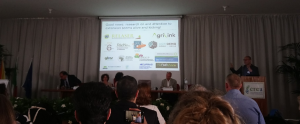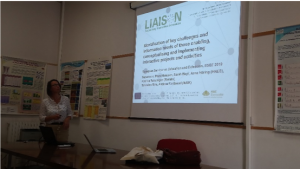Home » Agriculture
Category Archives: Agriculture
Farmer-centred innovation and knowledge exchange at the ESEE 2019
Beth Dooley is a second-year PhD student with the Centre for Rural Policy Research in the Sociology, Philosophy, and Anthropology Department. She received the Rowan Johnstone PhD Studentship to explore the myriad complexities involved with building resilience in UK agricultural policy.
Thanks to funding from the Centre for European Governance, I had the privilege of attending the 24th European Seminar on Extension (and) Education, or the ESEE 2019, from the 18-21 June 2019 in Acireale, Italy, positioned along the eastern coast north of the city of Catania, Sicily. As an agricultural lawyer specialising in farm succession planning, rural development, sustainable agriculture and mediation, I’m now broadening my skill set to include farmer learning and knowledge exchange as a rural sociologist by undertaking a PhD at the University of Exeter. Therefore, this conference was incredibly important to attend as the hub for the leading academics and practitioners working on agricultural knowledge exchange and innovation processes to highlight advances in research, practical implementation experiences, outcomes, benefits, challenges and next steps. Conference delegates came from all over Europe and beyond (Iran, New Zealand, US, etc.) to engage with issues around innovation throughout agriculture and the policy and governance structures that enable those processes to flourish. Key questions explored throughout the conference that I need to critically engage with for my PhD research and beyond in this field are the role of facilitation, farmer learning evaluation, complex decision making skills and capacity development, and how programmes, projects and initiatives value the targeted stakeholders’ input in designing the intervention meant to contribute to some type of change and learning, as well as how they facilitate the design of innovation support services to incorporate that approach.
The opening keynote address ‘Transformation, Disruption and Plurality in Agrifood Systems: Emerging Directions for Research on Extension’ was delivered by Dr. Laurens Klerkx of Wageningen University, challenging the delegation to think critically about future questions to explore how we understand and facilitate agricultural knowledge exchange and innovation processes.

Amongst many incredibly important areas identified in relation to policy and governance frameworks, he pointed to the inherent contradiction between the push for co-creation in agricultural research for innovation and the way current funding structures work. Co-creation involves research design, implementation and development of outputs through a process of engagement between on-the-ground stakeholders, researchers, advisors, etc. around topics that farmers find useful, relevant and necessary rather than a top-down decision from the researcher(s). As it is iterative and intended to foster innovation as well, what will come out of the process is unknown at the start, whereas funders typically require up-front expected deliverables. A change in funding approaches is needed to allow for the autonomy necessary to let this process happen, but it will hinge on policy makers understanding and trusting the process and will likely require the development of new ways to measure, quantify and evaluate impacts to justify expenditure from a public management standpoint.
Multiple breakout sessions were conducted over the four days, highlighting research and projects contributing to four different themes: 1) Education and Extension: roles, functions and tools for boosting interactive approaches to innovation, 2) New skills and capabilities for Extension to achieve innovation policies objectives, 3) Enabling policies for R&I: governance, frameworks and pathways, and 4) The changing role of monitoring and evaluation: approaches, methods and instruments. One of the projects funded under the Horizon 2020 research programme of the European Commission that presented a lot of findings was the AgriDemo project. Researchers talked about the key characteristics and best practical approaches for organising effective on-farm demonstrations identified through the project and how networks amongst the demonstration farms could operate as a support tool for learning. This work is relevant to my PhD research as I work on peer-to-peer learning and farmer engagement within group knowledge exchange events, more particularly farmer discussion groups. I’m conducting participant observation of seven groups over the course of nine months to a year and analysing the data through the lens of social learning theory as understood from an educational psychology point of view in addition to the work around communities of practice, both as applied to farmers and beyond. Thus, the findings not just around how to most effectively structure a public knowledge exchange event to promote farmer interaction and learning that may contribute to practice shifts, but also the limitations of current monitoring and evaluation methods in terms of measuring whether and to what extent learning happened for the participants were very instructive.
The H2020 project LIAISON (Better Rural Innovation: Linking Actors, Instruments and Policies through Networks) also presented its initial conceptual framework now at the start in gathering case study examples throughout Europe of rural innovation in an attempt to identify key characteristics that could be applied to help speed up innovation in other projects and networks. I provide research assistance to the LIAISON project as the University of Exeter is a partner in the 17-member consortium spread across Europe. We are currently in the stage of the project where we are identifying interactive innovation projects and conducting desk-based reviews of their project setup as well as interviews with a project representative to dig deeper into
 how the project was specifically designed and implemented utilising participatory approaches with various stakeholders to foster innovation in farm management and/or wider rural innovation. Based on this work where 200 projects across Europe will be profiled in the ‘light-touch review’, a smaller number of projects will be selected on which to conduct in-depth analyses of the core elements that were particularly important in promoting the innovation they fostered and how those elements could be applicable across other projects, regions and objectives to speed up innovation processes.
how the project was specifically designed and implemented utilising participatory approaches with various stakeholders to foster innovation in farm management and/or wider rural innovation. Based on this work where 200 projects across Europe will be profiled in the ‘light-touch review’, a smaller number of projects will be selected on which to conduct in-depth analyses of the core elements that were particularly important in promoting the innovation they fostered and how those elements could be applicable across other projects, regions and objectives to speed up innovation processes.
Finally, I was a co-organiser of the workshop session on ‘Evaluating farmer centred innovation: methodologies and evidence to capture multiple outcomes’, which we ran in the world café style to draw out opportunities, challenges and examples of methods from the session attendees. It targeted the 4th theme mentioned above – The changing role of monitoring and evaluation: approaches, methods and instruments – in relation to farmer-centred innovation as an increasingly popular approach to structuring agricultural interventions, but about which there are critical debates regarding how impact has been or could be demonstrated. This relates again to the issue presented above about funding and the evidence-based results required to justify public investment, but the current evaluation methods are criticised in terms of attributing causation to the intervention when many factors may have played a role in leading to change and thereby overstating impacts. The verifiability and rigorous assessment issues around learning and impact are particularly relevant to my work on farmer discussion group participation in relation to complex decision making and business strategic planning and management for resilience, as farmer knowledge and change in management practices have been monitored and measured, but questions arise as to what indicators could potentially be used in demonstrating capacity development and empowerment. The workshop highlighted many challenges and concerns from a quantitative comparability standpoint (e.g., lack of randomised control trials in measuring the learning process), but the participants also collaboratively brainstormed around possible combinations of evaluation methods that would allow for more in-depth understanding of participants’ internal developments and change through the learning process.
Recent Comments